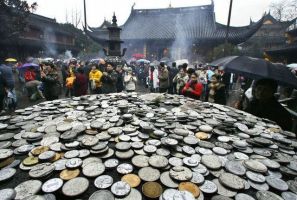
(Pic. sustainablechina.info)
At the temple,
I saw them completely engaged—-
The worshippers were busy
throwing the coins,
The priests were busy
collecting them.
For me,
difficult it was to say—
Who were the more devout?
But I came round:
It should be the collectors,
for
the throwers throw only now and then,
but the gatherers
continue with their hoarding forever.
.
————————————————————-
Since the time this poem was included in M.Ed. (English) syllabus of Tribhuvan University, I regularly receive emails from students asking me its meaning. Moreover, a number of people arrive at my Academia page while searching with keywords like “At the Temple/Prakash Subedi/Tribhuvan University” and so on. Therefore, this is my modest attempt to share some of my personal thoughts on this poem (trying not to disappoint those who arrive here).
I exactly don’t remember when I wrote this poem, but it was included in my first anthology of poems, Stars and Fireflies (2009).
Every reader is free to make her own interpretation of a text she reads, based on her own experience, exposure, and expertise, and this poem would not be an exception in any way. Therefore, my opinion on it is neither very important nor it matters much. But if I just have to respond to the question ‘what thoughts I had while composing it,’ I would say I was thinking about religion in general, but also about the way we observe religion in Nepal in particular.
Religion probably is the best and the worst among all human inventions. As a personal quest towards the ultimate meaning of being life, in its spiritual, ethical, and aesthetic senses, religion defines humanity at its best. But as an ideology and an organized dogma, religion has been one of the most unprogressive forces, and has been responsible for some of the worst crimes against humanity in the past and at present. Therefore, I believe, whenever we talk about religion, we should keep both of these antithetical aspects in mind.
While writing this poem, I was pondering over the relationship between the material and the spiritual aspects of religion: how religion has been completely misguided from its original ideals, and how it has become just another basis of discord. For instance, every religion promotes charity or donation, and it definitely is a good idea to make a contribution in the name of ‘god’ so that, on the one hand, you don’t cling much to what you earn or own, and, on the other, what you give can be utilized for the sake of those who are in need. But most of the (monetary) offerings we make in our temples these days lack that compassionate and benevolent motive on the part of those who donate, and are guided solely by the aim of bribing and winning the ‘divine favor’ to fulfill our selfish ambitions or of showing off how rich we are.
Similarly, those at the receiving end, the priests, too, aren’t any better either. In fact, they probably are much worse than those who give. They aren’t concerned at all about the actual objectives of charity, and are solely obsessed with amassing as much of wealth as possible for themselves. (As an example, just think of the rows that ensue among the Bhattas, the Rajbhandaris and the government every now and then on how the Pashupatinath funds should be divided!)
So, when I ask the question “who are the more devout?” I was actually thinking who could be worse between these two, the devotees who continue to throw the coins (out of greed to gain something) or the priests who keep on gathering them (cf. irony, i.e. saying something using its opposite). Though both of them are probably equally at fault in this regard, my personal assessment is that the priests should be considered as being more in the wrong, simply because they are supposed to be (and, they claim to be) the ‘learned guides’ of the otherwise ‘ignorant masses.’
More (and, varied) interpretations are possible, I’m sure, and I would love to hear from you! 🙂

Definitely this poem is mirror and map which guides all to adjust in this universe equally n harmoniously.
LikeLike
I was also confused about your satirical point of view but I am clear now. Thanks a lot for clearing my confusion.
LikeLiked by 1 person